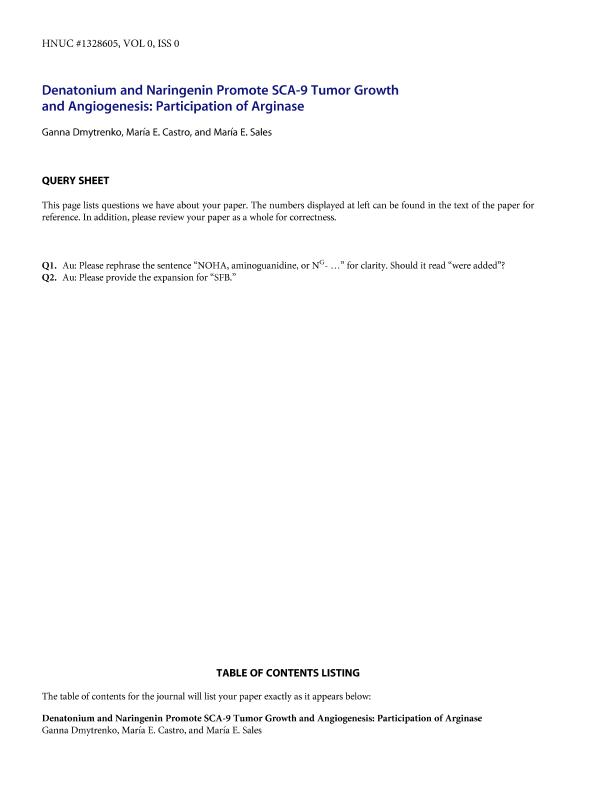Artículo
Denatonium and Naringenin Promote SCA-9 Tumor Growth and Angiogenesis: Participation of Arginase
Fecha de publicación:
07/2017
Editorial:
Lawrence Erlbaum Assoc Inc-taylor & Francis
Revista:
Nutrition And Cancer
ISSN:
0163-5581
Idioma:
Inglés
Tipo de recurso:
Artículo publicado
Clasificación temática:
Resumen
Submandibular gland (SMG) is one of the major salivary glands, and is formed by acinar cells that are conveyed to the oral cavity by a duct system. We had previously reported that T2R receptors that were originally identified in gustatory tissues were also present in murine SMG. The addition of bitter compounds to the gland reduced nitric oxide production and downregulated amylase secretion. In this work, we investigated the effect of two different bitter compounds namely denatonium and naringenin on tumor progression as well as the presence of T2R in SCA-9 cells derived from a murine tumor induced in SMG. Both compounds increased tumor cell proliferation in bi- and three-dimensional cultures. These effects were mediated by the activation of arginase and the inhibition of nitric oxide synthase. Denatonium and naringenin also increased vascular endothelial growth factor-A expression via arginase and tumor neovascularization in vivo. T2R6 and T2R4 were identified in SCA-9 cells by immunostaining. Also, Gi and Ggust proteins, which usually couple to T2R receptors, are expressed in these cells. Finally, we demonstrated for the first time that bitter compounds can exert pro-tumor actions that should be taken into account as side effects when they are used as nutraceuticals.
Palabras clave:
T2R
,
arginasa
,
progresion tumoral
Archivos asociados
Licencia
Identificadores
Colecciones
Articulos(CEFYBO)
Articulos de CENTRO DE ESTUDIOS FARMACOLOGICOS Y BOTANICOS
Articulos de CENTRO DE ESTUDIOS FARMACOLOGICOS Y BOTANICOS
Citación
Dmytrenko, Ganna; Castro, Maria Ester; Sales, María Elena; Denatonium and Naringenin Promote SCA-9 Tumor Growth and Angiogenesis: Participation of Arginase; Lawrence Erlbaum Assoc Inc-taylor & Francis; Nutrition And Cancer; 69; 5; 7-2017; 780-790
Compartir
Altmétricas




